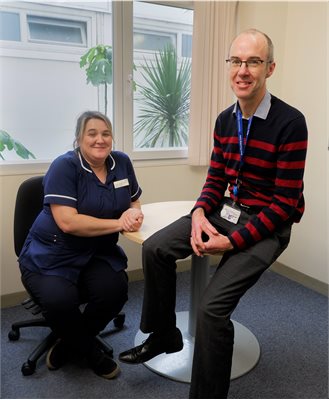NGH launches hypnotherapy support for some patients

Dr Paul Slater, and Louise Foulsham-Mcfall
A consultant and an operating department practitioner at Northampton General Hospital are introducing hypnotherapy support for some patients.
Consultant Anaesthetist, Dr Paul Slater, and Acute Pain Pracitioner (also an ODP), Louise Foulsham-Mcfall, will be looking to help patients manage pain, anxiety, and stress.
They will be offering some limited face-to-face support alongside online recorded sessions which patients can access from home.
Dr Slater has used hypnosis for over 10 years to help patients cope with medical procedures in operating theatres, clinics, and on labour wards, and trains staff locally and nationally on the use of hypnotic communication techniques in medical practice.
He said: “Clinical hypnosis has been used in medicine for over a hundred years and is a natural state of mind many of us experience spontaneously every day. When used therapeutically, it can be thought of as “guided daydreaming”.
“Whilst daydreaming, the mind is relaxed and more open to suggestions from the therapist. This allows more effective management when dealing with pain, anxieties and stresses.
“For example it can help reduce anxiety before hospital visits, reduce pain and anxiety during procedures or operations, and help patients to recover from hospital treatment.”
Louise said: “Visiting Hospital for a procedure, operation or investigation can cause anxiety this can be a major event in some people’s lives.
“Managing your anxiety, encouraging positive thinking, developing ways to increase your coping skills can all have a positive effect on your experience and help aid recovery.
“Clinical hypnosis is extremely safe. You will be treated with care and respect and not asked to do or say anything you are not comfortable with.
“You are in control of your own experiences under hypnosis, with the therapist acting as a guide. All hypnosis in a clinical setting is self-hypnosis.
“Most people have the ability to let themselves enter the hypnotic state, although some find it easier than others. There are different techniques available to suit different people.”
Because the pair will be helping patients in addition to their full-time jobs at the hospital the amount of support provided will be necessarily limited but Paul hopes the service will expand.
He said: “We will also be offering support, training, and encouragement to other NGH staff who want to develop skills in this area and in the long term we hope the therapy will be more widely available at hospital.
“Our therapy will be very much hospital focussed so we won’t be able to offer the more general support hypnotherapy is known for such as curing fears of flying and other phobias.”
Carefully produced online recorded sessions are available on the hospital’s website and cover managing pain, hypnosis in pregnancy and childbirth, and preparing for operations or procedures. There is also a Q&A on hypnotherapy. They can accessed at Clinical Hypnosis (northamptongeneral.nhs.uk)
Listening to the recordings should be done in a safe, relaxed environment, in case you fall asleep listening to the recording. The recorded sessions may not be suitable for people with severe psychiatric illness, trauma or addiction. The recordings are available in both male and female voices.
Posted on Tuesday 16th January 2024